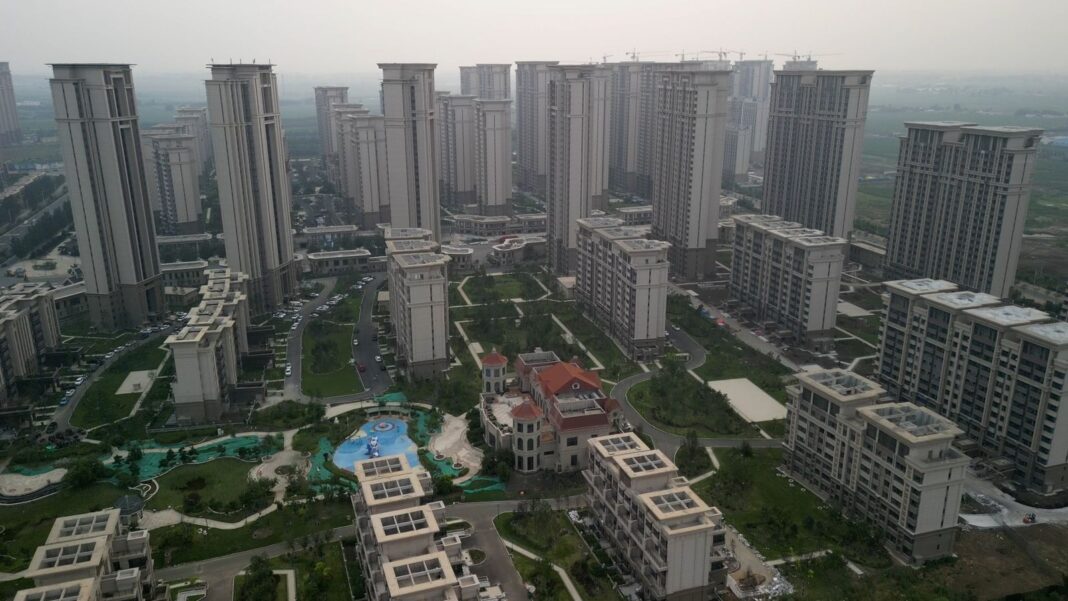In Changchun, northeast China, sits an apartment complex owned by Evergrande Group. There are dozens of buildings and tens of thousands of flats. But it was eerily quiet when we visited.
The compound was largely empty.
One couple told us they can’t move into their flat because it isn’t finished and the developer has told them they have run out of money to work on it.
They were nervous to speak to us and feared criticising the government.
“I’m upset and disappointed, because we trusted this developer, Evergrande,” Sunny, not her real name, told us. “What’s happening now is really heartbreaking. I’m having a hard time turning our lives around because I’m paying so much money into it. It is bleak.”
‘Sunny’ stands in an empty flat

The couple’s apartment is one of many that sits empty
People were not only sold homes, they were also sold a lifestyle.
The grand entrance includes a statue of half a dozen iron horses, there’s a row of shuttered shops with Western names, foreign restaurants that never opened, an overgrown playground and a theme park.
Buyers were told the development would include a school and a hospital, but they were never built.
The couple have young children and can’t live in the flat. It is too far from the city and there are no facilities.
I asked Tony, not his real name, if he felt the government had sold him a false dream about China. “Exactly, it was not realistic at all,” he replied. “I’m very worried about the pressure of life, about the apartment. This is unliveable. I feel I was lied to.”
The couple are in a deep financial hole. They must rent somewhere else and have lost all their savings.
More from Sky News:
Can China fix its economy?
EU threatens tariffs on Chinese imports

The couple spoke with their faces covered amid nerves about criticising the government
Most people we spoke to said buying into the complex was a bad investment.
Outside the neighbouring city of Shenyang, we came across another unfinished housing estate.
There were rows of grand crumbling villas, weeds grew through cracks and the concrete was beginning to crumble.
It’s another blighted symbol of China’s construction boom that has turned to dust.


Keep up with all the latest news from the UK and around the world by following Sky News
Greedy developers built too many homes too quickly. Analysts estimate there are between 60 and 80 million empty apartments across the country.
Now the central government has stepped in with a rescue package that includes cheaper loans and lower deposits to encourage people to buy.
The government is also lending local provinces money to buy millions of unsold flats and turn them into social housing. It’s the most significant step taken so far, but the scale of the problem is enormous, and it is unlikely this will be enough to solve it.

The developments were supposed to include facilities such as swimming pools and schools

Given this, all eyes were on a summit held by China’s Communist Party this week – but Its final communique essentially told people to strap in for more of the same, which means focusing on developing new technology rather than building houses, bridges and roads.
The Third Plenum is where the party sets China’s economic direction for the next five years and previous summits have been game-changers.
In 1978 Deng Xiaoping announced the “Reform and Opening” policy. In 1993 a “socialist market economy” was established and in 2013, the one-child policy was reformed.
President Xi Jinping has no shortage of slogans for transforming China’s economy. These include “new productive forces”, “common prosperity” and “socialism with Chinese characteristics”.

A giant screen in Beijing shows footage of President Xi Jinping at the third plenum. Pic: Reuters
The country has made great strides in developing electric vehicles, batteries and solar panels.
And the party’s message is clear, real estate is out of favour and green technology is in.
That is little help for millions of Chinese who bought into the property dream.
‘Sunny’ imagined her home would lead to a secure and settled future, instead it’s a daily struggle.
“The original plan was that after this we would have other family purchases, bigger properties, cars and things like that, or even a second, or third house, but none of it is possible now,” she said.







